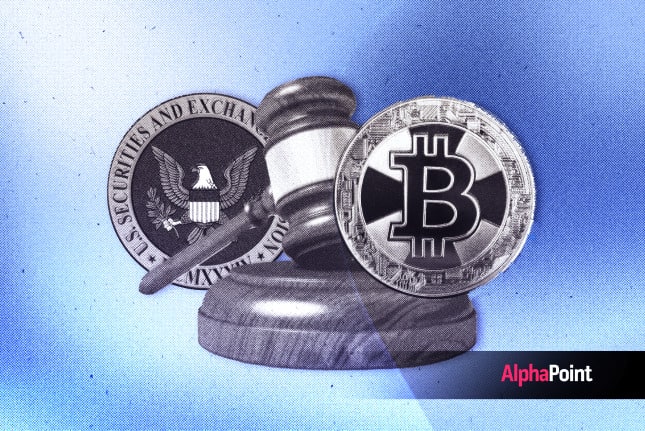SEC and Crypto in 2025: Key Updates You Need To Know

The U.S. cryptocurrency landscape is on the brink of a new dawn under the current administration. With Trump’s pro-crypto stance, the Securities and Exchange Commission’s (SEC) change in leadership, and the introduction of the new SEC Crypto Task Force, things are certainly about to change for crypto enthusiasts.
The SEC, previously regarded as a “crypto nemesis,” is expected to bring regulatory clarity to the crypto space. It may establish a more transparent and friendly crypto regulatory framework, instilling more confidence in retail and institutional investors.
The SEC is also expected to clarify its jurisdictional boundaries, potentially creating a balanced and effective relationship with other regulators.
What Are the SEC’s Guidelines for Cryptocurrency Regulation?
The SEC has, in the past, taken a “regulation-by-enforcement” approach instead of providing clear, proactive guidelines. Former SEC chair Gary Gensler’s administration filed many non-compliance lawsuits against crypto firms, particularly for failing to adhere to registration requirements.
However, it’s unclear whether these suits were justified. After all, while digital assets like Bitcoin (BTC) are classified as commodities under the Commodity Exchange Act, the classification of many other tokens remains unclear. Still, according to Gensler, crypto markets lacked regulatory compliance, not regulatory clarity.
Gensler’s stance was based on the Howey Test, which states that an asset qualifies as an investment contract if (i) it is “an investment of money (ii) in a common enterprise (iii) with profits to be derived solely from the efforts of others.”
The lack of clarity regarding the registration of crypto asset securities contributed significantly to several legal issues between the SEC and major crypto companies like Coinbase.
Per the SEC v Coinbase Inc. case, the SEC argued that Coinbase didn’t register transactions of thirteen cryptocurrencies as securities, hence violating the Securities Exchange Act of 1934.
The Formation of the SEC’s Crypto Task Force
The introduction of the new Crypto Task Force by SEC Acting Chairman Mark T. Uyeda is a welcome move. Under the leadership of Commissioner Hester Peirce, who took a pro-crypto stance even during the previous administration, the new task force represents a departure from the SEC’s previous “regulation-by-enforcement” strategy.
The task force aims to provide regulatory clarity while promoting investor protection and crypto innovation. It expects to achieve this by:
- Establishing clear crypto policies and guidance
- Providing practical paths to registration when warranted
- Crafting new, clearer disclosure frameworks
To establish a practical and effective regulatory framework, the task force is welcoming collaboration with industry participants, interested members of the public, and other federal regulators. This level of stakeholder involvement could result in more crypto-friendly federal securities laws.
The Impact of Leadership Changes on Crypto Policy
The SEC and stakeholders in the crypto industry haven’t had the best relationship in the past. Under Gensler, the regulatory body implemented numerous enforcement actions against stakeholders, including:
- Issuers of non-fungible tokens (NFTs) like Stoner Cats 2 LLC
- Crypto exchanges like Binance and Coinbase
- Crypto influencers like Austin Mahone and Kim Kardashian
Beyond taking a litigious stand against key players in the crypto space, the SEC also clashed with other regulators on cryptocurrency matters, derailing regulation.
For example, former SEC chair Gary Gensler and U.S. Commodity Futures Trading Commission (CFTC) Chair Rostin Behnam had varying views on the need for a clear crypto regulatory framework and the classification of crypto as commodities, resulting in siloed actions.
The transition in SEC leadership from Gensler to Acting Chair Mark Uyeda and the pending confirmation of crypto-advocate Paul Atkins will significantly impact crypto policy. Some of the expected changes include:
- A shift from prioritizing enforcement actions to developing a clearer regulatory framework: Already in the works through the new crypto-focused SEC Task Force.
- Increased collaboration between the SEC and CFTC: This could prevent unnecessary overlap in regulation.
The SEC’s Top Priorities for Crypto Regulation in 2025
SEC Commissioner Hester Peirce has issued disclaimers, cautioning that it will take significant time to untangle the regulatory mess caused by the previous SEC approach. According to Peirce, the SEC’s handling of crypto has been characterized by “legal imprecision and commercial impracticality,” making compliance challenging for crypto firms.
Nonetheless, the new Crypto Task Force aims to create a comprehensive and transparent regulatory framework. Here are the top priorities in 2025:
Clarifying the Status of Crypto Assets
The SEC’s first priority is determining which crypto assets qualify as securities to provide more clarification for projects, investors, and exchanges. This will create a more predictable legal framework and reduce uncertainty in cryptocurrency regulation.
Jurisdictional Clarity
Another priority of the SEC is to define its regulatory boundaries to ensure that the agency stays in its lane. Clarifying which areas fall within its jurisdiction will help avoid unnecessary overlap with other regulatory bodies like the CFTC and Financial Crimes Enforcement Network (FinCEN).
Jurisdictional clarity ensures that regulation is streamlined, preventing confusion about which authority can enforce specific rules, as well as reducing conflicts that could delay innovation.
Custody Frameworks
The SEC is also focusing on developing guidelines for crypto lending, custody, and staking programs. Clear crypto regulations will help institutional investors and issuers navigate the complexity of holding, staking, and managing crypto assets.
In addition, these regulations may help ensure that firms safeguard client assets from unnecessary risks and remain transparent in their custody practices.
Cross-Border Crypto Sandbox
The SEC is also prioritizing international collaborations through a cross-border crypto sandbox. This initiative will allow crypto projects to test new products and services in a controlled environment without getting tied up by legal and regulatory concerns.
This crypto sandbox will likely promote innovation while allowing global regulators to work collaboratively to address regulatory issues like data privacy and cross-border transactions.
Crypto ETF Regulations
The SEC Task Force also plans to establish specific requirements to eliminate uncertainty surrounding crypto exchange-traded funds (ETFs) approval.
The SEC’s evolving stance on crypto ETFs, which aligns with the Investment Company Act 1940, aims to enhance investor confidence and maintain market integrity.
Ongoing Litigation and Its Effect on Crypto Regulation
High-profile cases like SEC v Ripple are redefining how digital assets are classified and regulated. These SEC lawsuits are testing whether existing federal securities laws can fairly apply to decentralized digital assets.
The SEC charged Ripple with failing to classify XRP (Ripple’s cryptocurrency) as a financial security. The Ripple case, in particular, has raised fundamental questions about whether specific cryptocurrencies should be treated as securities, potentially changing the legal frameworks for exchanges, investors, and custodians.
To add to the uncertainty, the agency also lacks a confirmed chair, which has stalled approvals for ETFs holding XRP and SOL, as well as the expansion of future markets.
The good news is that resolving the current lawsuits could set the pace for future regulation. For example, a ruling in Ripple’s favor would necessitate more nuanced compliance guidelines from the SEC. Conversely, if the SEC wins, crypto firms could face stricter registration and reporting requirements.
What Lies Ahead for Crypto and the SEC
The relationship between the SEC and the cryptocurrency industry has changed drastically over the past year and is expected to continue evolving as leadership and structure changes occur. Here’s a look at what lies ahead.
The Future of Crypto ETFs in the U.S.
Despite its skeptical stance on cryptocurrencies, the SEC made pivotal decisions on crypto ETFs in 2024. The regulator approved 11 Spot Bitcoin ETFs on the New York Stock Exchange (NYSE), marking a significant milestone in the crypto landscape.
Following the January approval of funds like Grayscale Bitcoin Trust BTC, Fidelity Wise Origin Bitcoin Fund, and Invesco Galaxy Bitcoin ETF, the SEC approved eight Ethereum ETFs in May, further expanding the availability of crypto-based investment products for investors on regular stock exchanges.
With the regulator taking a more open outlook on the value of cryptocurrencies, this momentum is expected to continue. In fact, things are already looking up for crypto ETF enthusiasts — the SEC has begun reviewing Grayscale’s application to list an ETF for XRP (Ripple).
Further, Grayscale, Bitwise, 21Shares, VanEck, and Canary Capital have submitted filings for Dogecoin, Litecoin, Solana, Hedera Hashgraph’s HBAR, and Polkadot ETFs. And experts predict a high likelihood of approval for many of them.
If approved, more traditional traders will have exposure to crypto assets, which could result in greater adoption in the future.
Opportunities for Industry Engagement and Feedback
The SEC’s Crypto Task Force has invited the public to submit comments, participate in meetings, and provide valuable insights to help its members understand industry needs and challenges.
Encouraging engagement and continuous industry feedback could help shape friendly crypto policies that are practical, supportive of technological innovation, and address investor concerns on security, compliance, and consumer protection.
Considering market participants’ opinions when developing regulations could encourage wider crypto adoption by both institutional and retail investors.
Stay at the Forefront of Crypto in 2025 With AlphaPoint
Crypto experts expect the SEC to develop a more transparent legal environment for innovators and establish better investor protections in the coming years. This could contribute to the growth of digital assets in the U.S., making now one of the best times to adopt crypto services.
With AlphaPoint, you can enter the crypto space in a few weeks, rather than months or years. Whether you want to develop a crypto exchange, offer crypto payment services, or even get into asset tokenization or staking, we’ve got you covered.
Our robust white-label technology, equipped with everything from liquidity solutions to security tools, enables you to go to market quickly and capitalize on this growing sector.
Request a demo today to see how AlphaPoint can help you stay ahead of the curve!


